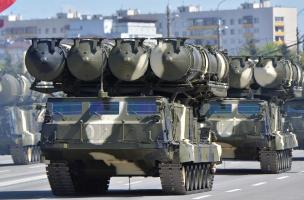|

In a Senate hearing last week, the State Department’s third-ranking official issued a stern warning to the Kremlin concerning its planned sale of the S-300 air defense system to Iran. “We have made it very clear to the Russians,” declared Under Secretary for Political Affairs Thomas Shannon, “that we consider this to be a bad move, that we consider it to be destabilizing and not in keeping with what we’ve been trying to accomplish, not only through the JCPOA, but broadly in terms of our engagement with Iran.” Vladimir Putin begs to differ. Yesterday, to the sound of crickets at Foggy Bottom, Tehran announced that Moscow had delivered the first part of the surface-to-air missile system. The Russian leader’s defiance should come as no surprise. After all, Putin is trying to accomplish very different things from what the State Department wants, not only through the nuclear agreement, formally known as the Joint Comprehensive Plan of Action (JCPOA), but broadly in terms of his engagement with Iran. The Russian and Iranian regimes typically describe the S-300 as a defensive weapon, and so it is. It can shoot down planes or cruise missiles up to 90 miles away and would complicate any American or Israeli effort to bomb Iran’s nuclear sites. But the S-300 also constitutes an offensive system, and it harbors the potential to shift the military balance of power in the region, which is yet another reason Tehran wants it so badly — and Moscow, one of its most important allies, remains eager to sell it. For example, Iran could move the truck-mounted and highly mobile S-300 to support its Houthi proxies in Yemen, which could then shoot down Saudi fighter jets. Putin himself has referred to such a possibility, noting last year, during a call-in TV show in Russia, that the S-300 could serve as “a deterrent factor in connection with the situation in Yemen.” Tehran could also export the system to the Assad regime or the terrorist group Hezbollah, which could then use it to deter Israeli air strikes from across the Lebanese or Syrian border. Alternatively, if Iran positioned the S-300 on its southern border, it could detect American and allied military flights in nearby bases and disrupt civilian air traffic. In effect, the S-300 enables Tehran to threaten the airspace of its neighbors. In this sense, Russia’s own use of the S-300 functions as a model. As Will Cathcart, a former media adviser to the president of Georgia, observed last April at the Daily Beast: “Putin has sent S-300 missile systems to Crimea and just about every breakaway Russia region on the map. This is not to protect those regions, of course. The point of the S-300 is to project power and achieve armed tactical control over the airspace of those territories.” The S-300 sale to Iran thus serves mutually reinforcing Iranian and Russian goals. For Tehran, the system facilitates its quest for regional dominance, which relies primarily on proxies in the Gulf and the Levant. For Moscow, the system enables it to project power in the Middle East through its Iranian ally, combat Western influence, and ultimately advance its revanchist ambition to undermine American global leadership. Moreover, the $800 million purchase will provide a much-needed injection of cash into the Russian economy. In large measure, our adversaries can thank the nuclear agreement for their good fortune. The ayatollahs and the Kremlin originally signed the S-300 contract in 2007, but Moscow froze the sale in 2010 following the passage of U.N. Security Council Resolution 1929, which called on states to “exercise vigilance and restraint” in selling weapons to Iran. However, in April 2015, just days after Iran and world powers reached an interim agreement that prefigured the final nuclear deal, Putin lifted the ban. And why not? Russia recognized that the nuclear deal, in its own way, inaugurated a tectonic shift in the region’s geopolitical equilibrium that favors both Moscow and Tehran at the expense of the United States and its allies. By lifting international sanctions on the Islamist regime, the pact would spur Iran’s emergence from global isolation, enable the regime to increase financial support for its terrorist proxies, deter attacks from hostile states, and reduce America’s leverage to influence its policies. Meanwhile, the Obama administration continues to labor under the delusion that the nuclear deal may yet moderate the regime. As Under Secretary Shannon noted in last week’s hearing, “it is our hope and our intent that as we pursue the JCPOA and as Iran begins to connect with our colleagues in the European Union and elsewhere, that the positive impact of that connection or connectivity is going to have a political effect in Iran.” The S-300 sale ought to quash these hopes. In fact, from their own perspective, Russia and Iran consider the transaction to be a good move that combats the region’s true source of instability: the United States. Their actions have made that very clear. Perhaps it’s time for the United States to start listening.
|



